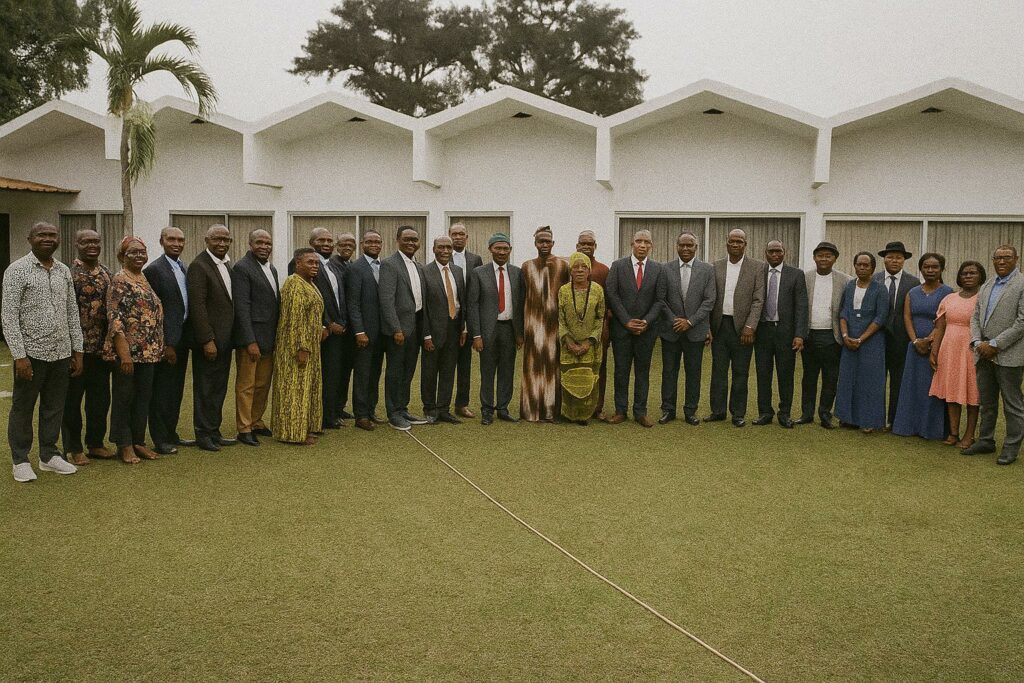Diplomatic Significance of the Pointe-Noire Consultations
In the Atlantic port city that handles over 80 percent of Congo-Brazzaville’s crude exports, the Municipal Hall of Pointe-Noire momentarily became a miniature multilateral arena. From 26 to 27 June, the Rencontre pour la Paix et les Droits de l’Homme (RPDH), with municipal backing, hosted a consultative roundtable on the country’s prospective after-oil horizon. While the meeting unfolded under the banner of civil-society engagement, its attendee list—senior officials from the Ministries of Hydrocarbons, Economy and Environment, representatives of SNPC, executives from Chevron and Perenco, alongside envoys of the European Union delegation—testified to its strategic depth.
Participants agreed that the conversation was not merely technical: it was a rehearsal for the diplomatic narrative Congo-Brazzaville intends to bring to COP 29 and to the forthcoming Africa-EU Green Partnership dialogue. A senior diplomat in attendance remarked that “the language of a ‘just and equitable transition’ is becoming as essential as the barrels we still lift daily.”
Energy Transition Stakes for a Hydrocarbon-Dependent Economy
Hydrocarbons account for roughly 57 percent of national GDP and nearly 90 percent of exports according to the World Bank (2023). This magnitude frames any transition as a calibrated shift rather than an abrupt pivot. The Energy Transition Fund, technical partner of the PAPCO project, presented scenario modelling that shows oil revenues beginning to plateau in the mid-2030s, mirroring International Energy Agency baseline forecasts (IEA 2024). Under the most conservative scenario, the Republic would need to replace at least a quarter of present fiscal receipts within twelve years to maintain current social spending levels.
Local authorities from Kouilou underlined that agro-industry, gas-to-power plants and value-added timber processing could deliver that buffer if logistical bottlenecks at the Port Autonome de Pointe-Noire are alleviated. The analysis resonated with the National Development Plan 2022-2026, endorsed by President Denis Sassou Nguesso, which ranks diversification as a ‘pillar of sovereignty’. No delegate openly questioned the premise that hydrocarbons will remain a key revenue stream throughout the transition period; rather, the emphasis was on sequencing and risk management.
Government Roadmaps and International Frameworks
The Ministry of Hydrocarbons reiterated its intent to publish, before year-end, a Strategy for a Low-Carbon Petroleum Sector that dovetails with the nation’s Updated Nationally Determined Contribution. Such alignment is designed to unlock concessional financing from the African Development Bank’s Climate Action Window (African Development Bank 2024). Meanwhile, the meeting’s communique cautiously endorsed Congo’s exploration of membership in the Beyond Oil and Gas Alliance, provided the Alliance recognises ‘transitional natural gas’ as an enabling fuel. This conditionality mirrors positions adopted by several Gulf producers and signals Brazzaville’s preference for pragmatic multilateralism.
A senior official from the Directorate-General of the Environment stressed that adherence to the Alliance would not equate to an immediate moratorium on new oil licences. Instead, it could secure technology-transfer packages for methane-leak monitoring and carbon-capture pilots. Such incentives, delegates argued, would complement the Congo LNG project currently under appraisal.
Private Sector and Civil Society Convergence in Kouilou and Beyond
On the business flank, local SMEs welcomed the prospect of solar-powered desalination plants to serve Pointe-Noire’s growing population, a venture expected to generate 1 500 direct jobs. Civil-society representatives, for their part, pressed for inclusive governance of transition funds, recalling the mixed legacy of earlier oil-revenue management mechanisms. RPDH’s coordinator, Fidèle Mboumba, argued that “a transparent social compendium of transition benefits will anchor public trust just as effectively as any fiscal stimulus.”
Yet the exchanges never drifted into adversarial rhetoric. Observers noted that dialogue culture in Congo, long fostered through presidential consultations on peace and development, imbued the roundtable with a consensus-building reflex. The result was a provisional roadmap centred on four action lines: institutional reform, infrastructure upgrades, human-capital investment and environmental safeguards.
Financing a Just and Equitable Diversification
Funding is the linchpin. Estimates aired at the meeting place the initial outlay for priority diversification projects at 3.4 billion USD over five years—slightly above one-third of Congo’s 2023 GDP (Ministry of Finance 2024). Authorities envisage a blend of sovereign sukuk bonds, green-labelled eurobonds and public-private partnerships. Development financiers present in Pointe-Noire emphasised that demonstrable social co-benefits will be decisive for concessional terms. They also welcomed the proposal to channel part of the national oil-stabilisation account into a Future Generations Fund, modeled loosely on Norway’s oil fund but calibrated to local realities.
International advisers underscored, however, that debt sustainability metrics must remain within IMF moderate-risk thresholds to prevent crowding out social spending. Government representatives responded by pointing to the recently concluded debt-service rescheduling with major bilateral creditors as evidence of prudent stewardship.
Strategic Outlook for Regional Leadership
As proceedings drew to a close, delegates highlighted the strategic opportunity for Congo-Brazzaville to position itself as a regional laboratory of orderly transition in Central Africa. The final communiqué pledges to circulate the pre-roadmap to ECCAS member states ahead of the October summit in Libreville, fostering a dialogue that could harmonise cross-border electricity trade and green-hydrogen corridors.
By hosting the roundtable in Pointe-Noire rather than the capital, organisers sought to symbolically anchor the debate in the very city whose fortunes are intertwined with crude exports. The gesture underscores a broader diplomatic message: transition conversations are most credible when conducted where their effects will be felt first. Whether the nascent roadmap matures into actionable policy will depend on sustained multi-stakeholder commitment, but the tone set this June suggests a deliberate, methodical recalibration rather than abrupt discontinuity—a posture likely to reassure both domestic constituencies and international partners.

